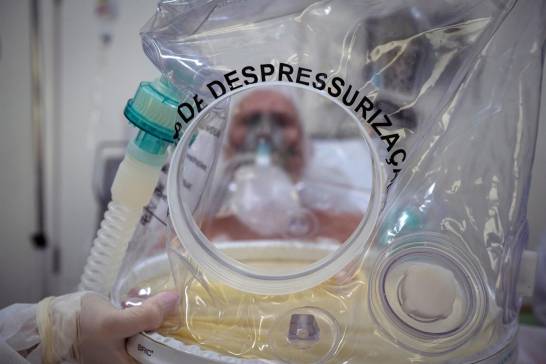The member states of the World Trade Organization (WTO) have been negotiating for two years. Nothing less was at stake. global access to medical products against covid-19, not only vaccines, but also drugs and tests. A world problem that could only be solved globally, everyone agreed.
The Agreement on Trade-Related Aspects of Intellectual Property Rights (TRIPS) is not having the effect it could and should have and is a dangerous example for future pandemics
The outcome of the negotiations is often celebrated as a success, but in the case of the June 24 decision, the commemoration would be totally out of place as the agreement reached on Trade-Related Aspects of Intellectual Property Rights (TRIPS) it does not have the effect it could and should have and it is a dangerous example for future pandemics.
Crises always have a potential for development
As promising as the declarations of solidarity were at the beginning of the pandemic, when it came to launching initiatives such as COVAX or the TRIPS exemption proposal, it was precisely the developed countries that blocked and prevented them. Collectively, we seem to have learned nothing from the HIV/AIDS pandemic.
Unfortunately, the opportunity to take seriously the general health and guarantee yours sustainability. A global healthcare system dependent on a few big pharmaceutical companies in developed countries is not up to the challenges we faced two years ago and will face again. However, our policymakers have left the necessary steps to change it for generations to come.
When it came to launching initiatives such as COVAX or the TRIPS exemption proposal, it was precisely the developed countries that blocked and prevented them.
A resolution that makes things worse
the request that South Africa and India submitted to the WTO in October 2020, combined with the rapid transfer of technology and expansion of production capacity, could have saved many lives.
On the contrary, the decision taken deviates from the real objective of the request for exemption from TRIPS to the point that it is no longer possible to speak of an effective measure to control the pandemic. These are the main criticisms:
- Ineffective instrument instead of integral solution. The intended suspension of intellectual property rights was not granted during the pandemic. Instead, there is talk of an existing instrument to expand production in the event of the pandemic: compulsory licenses, which must be negotiated individually for each product and country, an extremely long and open process in each case, which makes it impossible to act. quickly. In other words, unsuitable for a pandemic.
- Only vaccines instead of all medical products relevant to covid-19. Mandatory licenses can only be granted for Covid-19 vaccine licenses. However, diagnostic tests and medications, for example, are at least as important to the pandemic response. Countries with low vaccination rates are especially dependent on them. And they need it now, not six months from now, when it comes back on the agenda.
- No production for existing manufacturers in the global south. Countries in these zones that already have domestic production capacity were asked not to use the option of compulsory license negotiations. And for eligible countries, the exemption is only valid for five years. So even if they can invest in new production capacity now, they will have to stop production in five years when the exemption expires.
Thus, this decision does not help to contain the pandemic. Furthermore, with current production in the global south, it ties the hands of those who could now help more people access covid-19 products faster and cheaper.
This decision will not contribute significantly, if at all, to more equitable distribution and access to vaccines. But it is also that vaccines could only be produced – if the respective compulsory licensing negotiations are positive – but currently medicines are urgently needed.
This decision cements flaws in the system itself and this is especially dangerous in light of the looming pandemics.
Europe was not up to the task
The result and, above all, the role of European governments is disheartening because, instead of pragmatically and courageously allying itself with the more than 100 countries that supported a concrete proposal for the rapid and global containment of the pandemic with the exemption of TRIPS, Europe blocked , delayed and negatively influenced the negotiations.
For decades, we have seen how our patients often cannot be treated properly because either modern and effective drugs are lacking, as in the field of tuberculosis and snakebites, or high prices make drugs unaffordable, as in the field of new drugs for HIV and hepatitis. . This is because the medical research system is not oriented towards health needs, but towards profit opportunities. This systemic error backfires especially during pandemics.
Those who wonder why Doctors Without Borders we care about international trade law, like TRIPS, now you can understand: we are obligated to do so. By themselves, the governments of developed countries will not create a sustainable global health system that meets the needs of all.
Melissa Scharwey is a specialist in access to medicines at Doctors Without Borders in Berlin.
